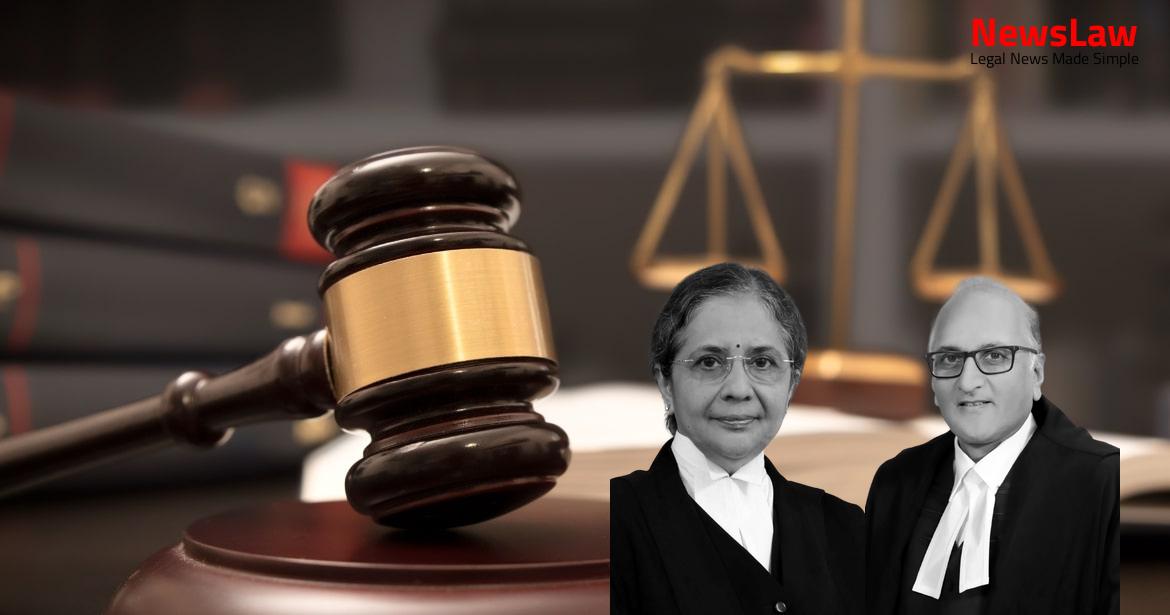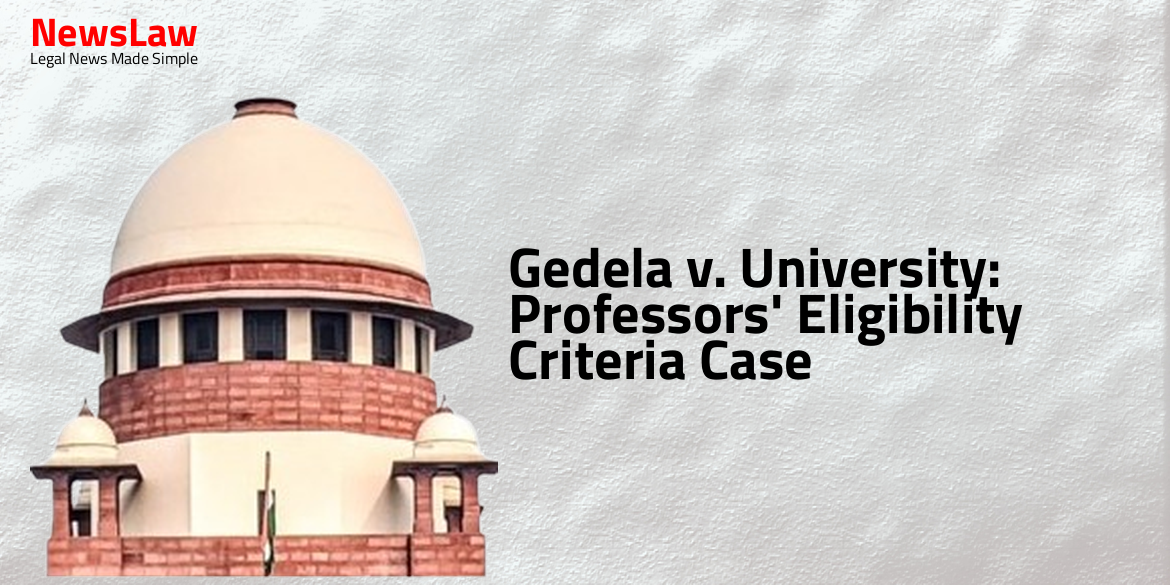In a recent legal case in the public sector, the court delved into the intricate legal analysis of the difference between upgradation and promotion. The focus was on understanding the implications of administrative orders and regulations in the context of employment law. This summary sheds light on the court’s critical analysis of the laws governing public sector employment and the interpretation of regulations in staff appointments and upgradations.
Facts
- The PSEB issued an office order on 29.03.1990 upgrading 20% of Junior Engineer-II (Civil) posts to that of Junior Engineer-I (Civil) in higher scales.
- To address cadre stagnation, a scheme for time-bound benefits of promotional scales was introduced from 01.01.1986 after 9/16 years of service.
- Employees failing to meet qualification for promotion would still be placed in the promotional scale as specified by the Board.
- An order dated 31.08.1990 partially modified the pay scale of Junior Engineers (Civil) granting them Rs. 2000-3500 after 9 years and Rs. 2200-4250 after 16 years of service.
- The respondents filed a writ petition seeking the pay scale of Executive Engineer on completion of 16 years, claiming denial of benefits accrued from previous office orders.
- The Single Bench of the High Court allowed the petition, finding the office order dated 29.03.1990 invalid as it was not notified in the Official Gazette as per the Electricity Act, 1948.
- The respondents argued for the pay scale of Rs. 2200-4250, which was supposedly denied by the creation of Junior Engineer-I (Civil) posts in the 20% cadre upgrade.
- The High Court relied on Section 79 of the Act to declare the office order dated 29.03.1990 unenforceable.
- For a higher pay structure to be permissible in a time-bound frame, it must be equivalent to that of the promotional post.
- The Division Bench dismissed the appeal filed by PSEB, stating that the Board’s actions deprived employees of their legitimate right to promotion.
- The creation of an intermediary pay structure of Rs. 1600-2000-3500 was seen as an attempt to deny employees their due promotion benefits.
- It was emphasized that any deviation from regulations must result in entitlement to the pay scale of the next higher post if promotion cannot be granted.
- Creating a higher pay structure for a Junior Engineer (I) may be permissible through the introduction of a scheme, even if the creation of the post itself is not allowed.
- The appeal is against the Division Bench’s decision dated 30.08.2018 in LPA No 2062 of 2014, which upheld the Single Bench’s order in CWP No 3232 of 1993.
- PSEB passed a resolution to address the issue of stagnation among regular employees but was criticized for devising an intermediary pay structure to undermine employee rights.
Also Read: Electoral Malpractices in Mayor Election
Issue
- The main issue before the court is whether the office order needed to be published in the Official Gazette as mandated by Section 79 of the Act.
Also Read: Balancing Power and Transparency: Electoral Bonds Struck Down, Disclosure Mandated
Arguments
- The petitioner argued that the office order dated 23.04.1990 was issued to address the issue of stagnation in the cadre of Junior Engineers, not to provide a path for promotion outside the regulations.
- Only 20% of the Junior Engineer-II (Civil) posts were upgraded to Junior Engineer-I (Civil) through the office order dated 29.03.1990.
- The PSEB had the authority under Regulation 3 to adjust the number of posts in the cadre as needed.
- In the absence of specific regulations, executive orders are legally permissible.
- The respondents claim that the office order dated 29.03.1990 took away higher salary scales they were entitled to before its issuance.
- The respondents argue that the creation of new posts of Junior Engineer-I without amending the existing regulations was unlawful.
- Regulation 17 empowers PSEB to adjust pay scales for Engineers (Civil) without requiring publication in the Official Gazette.
- The appellant contends that the purpose of the order dated 23.04.1990 was to provide relief from stagnation for eligible candidates, not to alter conditions of service.
- The order allegedly aimed at creating new promotion opportunities, disadvantaging the respondents.
Also Read: Recall of Resolution Plan Approval: Legal Analysis
Analysis
- The Punjab State Electricity Board (PSEB) has the power to make regulations under Section 79 of the Electricity (Supply) Act, 1948.
- The PSEB has exercised this power to create the Punjab State Electricity Board Service of Engineers (Civil) Recruitment Regulations, 1965.
- Regulation 17 of these regulations states that members of the service are entitled to a scale of pay authorized by the Board.
- The Board may grant an initial start higher than the minimum pay of the scale for individuals with additional qualifications or experience.
- In the absence of Rules or Regulations governing the service conditions of employees, the Electricity Board has the power to issue administrative orders.
- The power of the State Electricity Board to issue circulars in the absence of regulations is permissible under the Electricity (Supply) Act, 1948.
- The Board can issue circulars even if not explicitly provided in the statute.
- An enabling provision allows the Board to lay down service conditions by regulations.
- Promotion and upgradation are distinct concepts with different implications.
- Upgradation results in a higher pay scale without a change in position or duties.
- The office order dated 23.04.1990 aimed to address stagnation but did not grant an automatic right to a higher pay scale without fulfilling qualification criteria.
- The Board’s power to issue circulars was not disputed in the case.
- The validity of the circular letters was not questioned.
- Administrative orders can be issued in the absence of specific regulations.
- The Board’s power to prescribe service conditions through administrative orders is upheld.
- Distinction between upgradation and promotion highlighted.
- Legal position regarding upgradation versus promotion discussed.
- Office order dated 29.03.1990 only upgraded 20% of posts without creating new promotional posts.
- Employees were already granted time-bound scales as per the schedule specified.
- High Court’s judgement set aside due to misinterpretation of the 1990 Order.
- Employees’ claim for higher pay scales for Assistant Engineer and Executive Engineer positions found misconceived.
- Regulation 17 of the Regulations entitles service members to authorized scales of pay by the Board.
- Employees not entitled to higher pay scales without fulfilling qualifications for higher posts.
- Board authorized to discharge functions, including staff appointments and upgradations.
- No record of selection process for benefit of office order upgradation noted.
- PSEB empowered to appoint employees per Section 15 of the Act.
- Advancement to higher pay scale without changing post identified as not requiring selection process.
- Office order dated 23.04.1990 aimed at alleviating stagnation among various cadres of employees.
- PSEB authorized to fix scales of pay for posts specified in the Regulations.
- Difference between upgradation and promotion in terms of rank and grade clarified.
Case Title: PUNJAB STATE POWER CORPORATION LIMITED Vs. BAL KRISHAN SHARMA (2021 INSC 773)
Case Number: C.A. No.-006995-006995 / 2021



